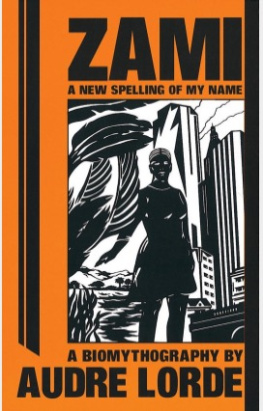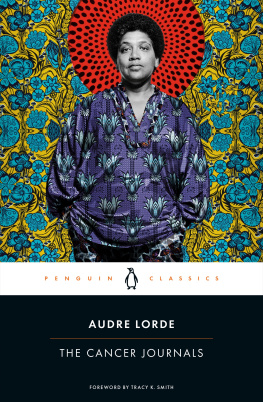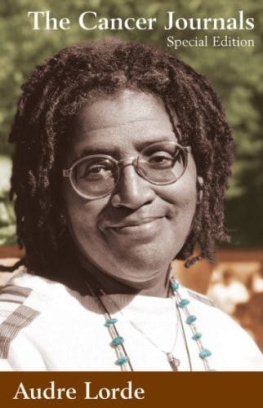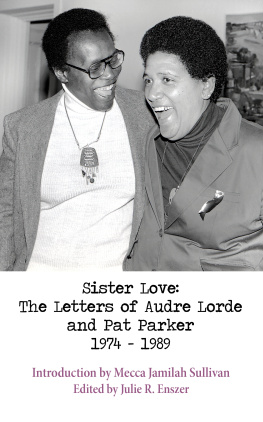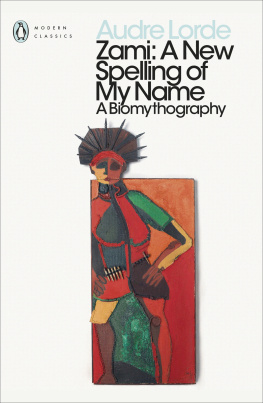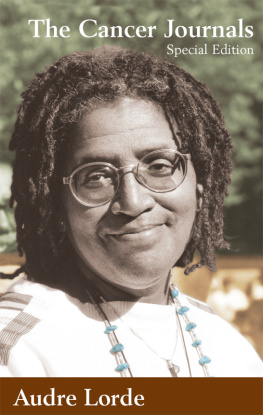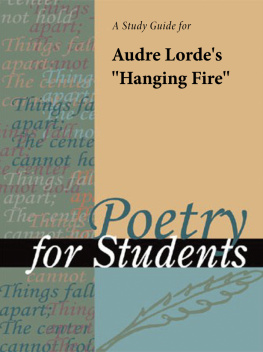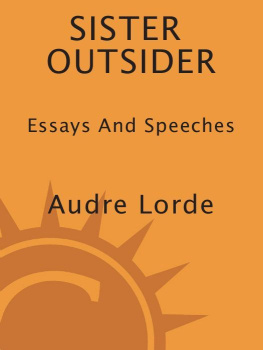All rights reserved. Published in the United States by Ten Speed Press, an imprint of the Crown Publishing Group, a division of Random House, Inc., New York.
www.crownpublishing.com
www.tenspeed.com
Crossing Press and the Crossing Press colophon are registered trademarks of Random House, Inc.
Lorde, Audre.
Sister outsider.
(The Crossing Press feminist series)
I. Title. II. Series.
PS 3562.75 S 5 1984 814.54 841844
Acknowledgments
I wish to acknowledge the invaluable help of each one of the women who supported me through these writings, with particular note of appreciation for the patience and insight of my editor, Nancy K. Boreano, who has helped to make the whole process real again.
Contents
Foreword
W ITH ITS PARADOXICAL TITLE , Sister Outsider, Audre Lordes most influential book of prose, is ever more trenchant twenty-three years after its first printingsurpassing even the reputation of her poetry, which is no minor feat. Were she here among us in the funky U.S. instead of floating somewhere over the Guinea Coast, Lorde would still want and have to claim that outsider stance. These prose works, much like her poetry, position her (and us), as Akasha Gloria Hull said many years ago, on the line, refusing the safety of that inside perimeter. I return to these texts again and alwaysin these times of imperial and unnatural acts, like the war in Iraq and the federal abandonment of the Gulf Coast survivors in the wake of Hurricane Katrina. Sister is my sister no matter how I may reject her counsel: As Black people we must move against not only those forces which dehumanize us from the outside, but also against those oppressive values which we have been forced to take into ourselves.
On the shelf with or at the bottom of that stack of other well-mined tomesThe Black Woman: An Anthology; Conditions: Five, The Black Womens Issue; Lesbian Fiction; Top RankingSister is never far from me. I retain several dog-eared, underlined, coffee-splotched copies of herat home, at work, on my nightstandas necessary as my eyeglasses, my second sight.
A fall semester of teaching my womens studies seminar never passes without deploying one of the following texts in theorizing feminist activism: Age, Race, Class, and Sex: Women Redefining Difference, An Open Letter to Mary Daly, or The Uses of Anger: Women Responding to Racism. In one paragraph, Lorde can simultaneously blow away the entire Enlightenment project and use its tools, too.
In 1990 I quoted myself in Knowing the Danger and Going There Anyway, an article I wrote on Lorde for the Boston feminist newspaper, Sojourner; Ill change the sister trope and quote myself again: I said that Audre Lordes work is a neighbor Ive grown up with, who can always be counted on for honest talk, to rescue me when Ive forgotten the key to my own house, to go with me to a tenants or town meeting, a community festival. In 1990, Lorde was still walking among us. Sister Outsider has taken its creators place as that good neighbor. And with this new edition, we will have our good neighbor and sister for another generation. May those of us who are Sister Outsiders old neighbors continue to be inspired by her luminous writing and may those new neighbors be newly inspired.
C HERYL C LARKE
2007
Notes
Learning from the 60s, p. 135.
The Masters Tools Will Never Dismantle the Masters House, p. 112.
Eye to Eye: Black Women, Hatred, and Anger, p. 159.
Cheryl Clarke, The Days of Good Looks: Prose and Poetry, 19802005 (New York: Carroll & Graf, 2006).
Introduction
W HEN WE BEGAN EDITING Sister Outsiderlong after the book had been conceptualized, a contract signed, and new material writtenAudre Lorde informed me, as we were working one afternoon, that she doesnt write theory. I am a poet, she said.
Lordes stature as a poet is undeniable. And yet there can be no doubt that Sister Outsider, a collection of essays and speeches drawn from the past eight years of this Black lesbian feminists nonfiction prose, makes absolutely clear to many what some already knew: Audre Lordes voice is central to the development of contemporary feminist theory. She is at the cutting edge of consciousness.
The fifteen selections included here, several of them published for the first time, are essential reading. Whether it is the by now familiar Uses of the Erotic: The Erotic as Power, opening us up to the potential power in all aspects of our lives implicit in the erotic,
When I speak of the erotic, then, I speak of it as an assertion of the life-force of women; of that creative energy empowered, the knowledge and use of which we are now reclaiming in our language, our history, our dancing, our loving, our work, our lives.
or the recently authored Eye to Eye: Black Women, Hatred, and Anger, probing the white racist roots of hostility between Black women,
We are Black women born into a society of entrenched loathing and contempt for whatever is Black and female. We are strong and enduring. We are also deeply scarred.
Lordes work expands, deepens, and enriches all of our understandings of what feminism can be.
But what about the conflict between poetry and theory, between their separate and seemingly incompatible spheres? We have been told that poetry expresses what we feel, and theory states what we know; that the poet creates out of the heat of the moment, while the theorists mode is, of necessity, cool and reasoned; that one is art and therefore experienced subjectively, and the other is scholarship, held accountable in the objective world of ideas. We have been told that poetry has a soul and theory has a mind and that we have to choose between them.
The white western patriarchal ordering of things requires that we believe there is an inherent conflict between what we feel and what we thinkbetween poetry and theory. We are easier to control when one part of our selves is split from another, fragmented, off balance. There are other configurations, however, other ways of experiencing the world, though they are often difficult to name. We can sense them and seek their articulation. Because it is the work of feminism to make connections, to heal unnecessary divisions, Sister Outsider is a reason for hope.
Audre Lordes writing is an impulse toward wholeness. What she says and how she says it engages us both emotionally and intellectually. She writes from the particulars of who she is: Black woman, lesbian, feminist, mother of two children, daughter of Grenadian immigrants, educator, cancer survivor, activist. She creates material from the dailiness of her life that we can use to help shape ours. Out of her desire for wholeness, her need to encompass and address all the parts of herself, she teaches us about the significance of differencethat raw and powerful connection from which our personal power is forged.
A white Jewish lesbian mother, I first read Man Child: A Black Lesbian Feminists Response several years ago as I was struggling to accept the inevitability of my prepubescent sons eventual manhood. Not only would this boy of mine become a man physically, but he might act like one. This awareness turned into a major crisis for me at a time and place when virtually all the lesbian mothers I knew (who I realized, with hindsight, were also white) either insisted that their androgynous male children would stay that way, would not grow up to be sexist/misogynist men, or were pressured to choose between a separatist vision of community and their sons. I felt trapped by a narrow range of options.


